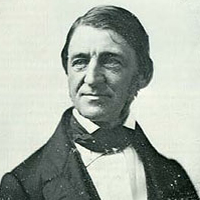Brahma by Ralph Waldo Emerson: Summary and Analysis
Brahma is a poem by Ralph Waldo Emerson, written in 1856. It is named after Brahma, the Hindu god of creation. Brahma is one of the gods in Trinity (Consisting of Brahma, Vishnu and Mahesh). Brahma is a poem that presents a faithful version of a basic idea stressed in the Bhagawad Gita that is the souls' immortality.

Ralph W. Emerson (1803-1882)
Brahman, according to Hinduism, is the ultimate soul of the universe- "an uncreated, illimitable and timeless essence of being". Brahma expresses his spiritual vision that comes from his reading of eastern religion, especially Hinduism, Confucianism, and Islamic Sufism.
Brahma is the speaker in this poem and entire poem is his appreciation. Brahma presents himself as the center of this universe. Whatever activities happen in this world they happen because of Brahma. He is timeless, immortal and permanent. He can't be destroyed. He is omnipresent. He symbolizes the creation of the human soul. A person may be killed physically, but his soul is not killed. It passes from one person to another and thus, is eternal and immortal. Nothing is secret to Him. Shadow and sunlight are the same for Him. He treats shame and fame at the same level. The vanquished gods also appear to Him. He resides in Heaven. He can't be doubted because He Himself is doubter and doubt. A slayer and the slain are also the result of the same spirit. If anything is far or forgotten, that thing is very close to Brahma. If anyone sings, Brahma is the music. If anyone flies, Brahma is the wings. Brahma is also aware that human beings are competing to get him. But Brahma suggests mankind to develop goodness and reach close to him. Brahma, the speaker, concludes the poem with a suggestion that if people finds his way to Brahma's essence, he will have all that he needs for all eternity.
This poem is the poetic extension of American romanticism known as transcendentalism. According to this philosophy, we all of us are the product of the same One-soul. We are born out of the same parent. If the father is same, children are equal. The self of one individual is as important as the self of the other individual. But only thing is that we should learn to rely on ourselves. From this point of view, self-reliance is an important aspect of American transcendentalism.
Emerson through Brahma is trying to convey the same message. If we want to achieve Brahma, goodness is the only solution and that goodness lies in our self. In this respect, this poem is the celebration of the self. Emerson’s Brahma, the supreme Hindu god relies on Hindu sources to assert a cosmic order beyond the limitation of sense perception. Brahma represents the eternal, infinite soul of universe where every individual soul gets united.
The imagery used in this poem is partly based on the 'Vishnu Purana' to which Emerson frequently refers in his journals. Emerson's poem Brahma is miraculous in its blend of Eastern and Western thought. In the poem, Emerson assumes the role of Brahma, the Hindu God of creation. Emerson is able to use clever, yet complex, paradoxical logic in order to present his philosophy in poetic terms. Throughout the poem, Emerson alludes to Hindu mythology. The knowledge of which he gained through reading the Bhagavad-Gita and other Hindu scriptures.
This poem has four stanzas with four lines in each. It is rhymed as abab written in Pyrrhic-tetrameter. It is a lyric song.
Related Topics
The Snow Storm: Summary and Analysis
Ode Inscribed to W.H. Channing: Analysis
Ralph Waldo Emerson: Biography
 |
bachelorandmaster.com |